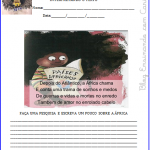It is very important that teachers bring to the classroom issues that are essential for the education and respect of students. Therefore, talking about black consciousness must be highlighted in the classroom. With this in mind, we separated ideas on how to work with text interpretation on black consciousness. In this way, your students will understand that there is no difference between black and white, and that everyone needs to be respected.

1- Ask students to comment on the information they find interesting.
2- Knowing the history of Black Consciousness Day: who was Zumbi dos Palmares?
Start this moment by asking students if they know the date on which Black Consciousness Day is celebrated and why it is celebrated on this day.
3- After listening to the opinions of the students, in order to learn about the History of the Black Consciousness Day and know who it was and the importance of the Zumbi dos Palmares character, distribute a copy of part of the text "History of the National Day of Black Consciousness", to be read and debated by the whole class, also with the mediation of the teacher of History.
History of the National Day of Black Consciousness
The date of November 20th was established by bill number 10.639, on January 9th, 2003, for the commemoration of Black Consciousness Day. This date was chosen because on this day, in the year 1695, Zumbi, leader of the Quilombo dos Palmares, died.
The tribute to Zumbi was more than fair. He is a historical character who represented the struggle of black people against slavery, in the period of Colonial Brazil. He died in combat, defending his people and his community. The quilombos represented a resistance to the slave system and also a collective way of maintaining African culture here in Brazil. Zumbi fought to the death for this culture and for the freedom of its people.
The creation of this date was important, as it serves as a moment of awareness and reflection on the importance of African culture and people in the formation of national culture. African blacks have collaborated a lot, throughout our history, in the political, social, gastronomic and religious aspects of our country. It is a day that we should celebrate in schools, cultural spaces and elsewhere, valuing Afro-Brazilian culture.





Did you like it? Share this post on your social network
 ACTIVITIES ON THE ABOLITION OF SLAVERY
ACTIVITIES ON THE ABOLITION OF SLAVERY
 TEACHING SEQUENCE BLACK CONSCIENCE
TEACHING SEQUENCE BLACK CONSCIENCE
 Beautiful girl in the ribbon bow - text
Beautiful girl in the ribbon bow - text
 Activities About the Book: Lele's Hair
Activities About the Book: Lele's Hair
 I BOOK LELE'S HAIR TO PRINT
I BOOK LELE'S HAIR TO PRINT
 Beautiful Girl in the Ribbon Bow – Activities
Beautiful Girl in the Ribbon Bow – Activities
This site uses Akismet to reduce spam. Learn how your comment data is processed.
